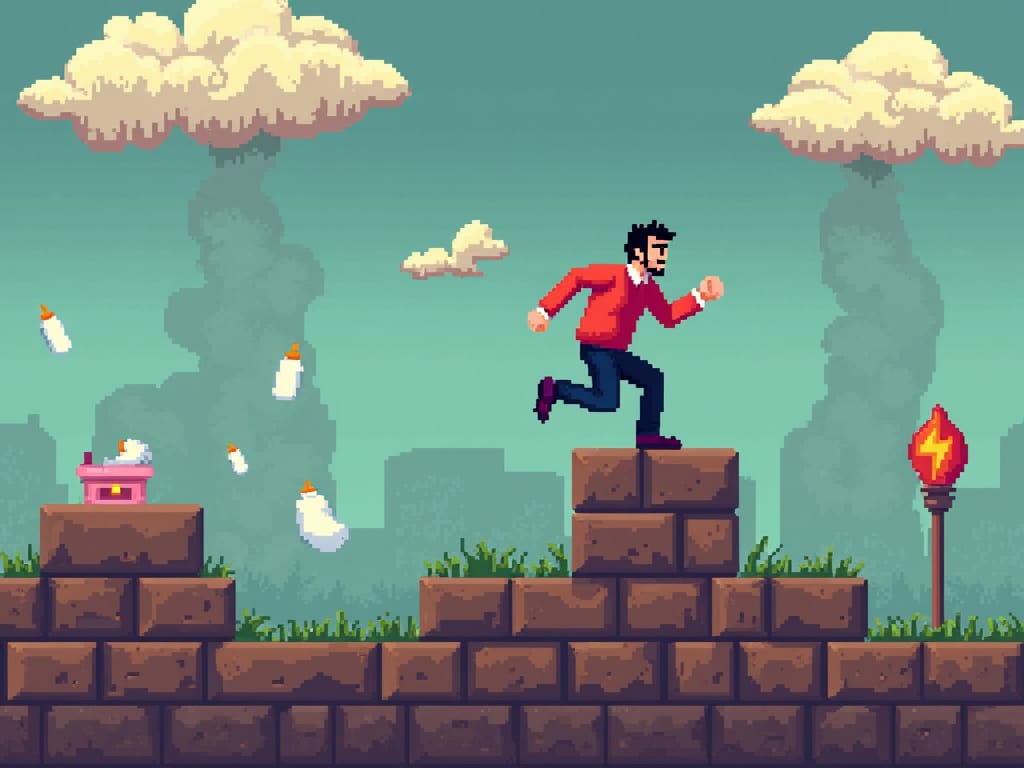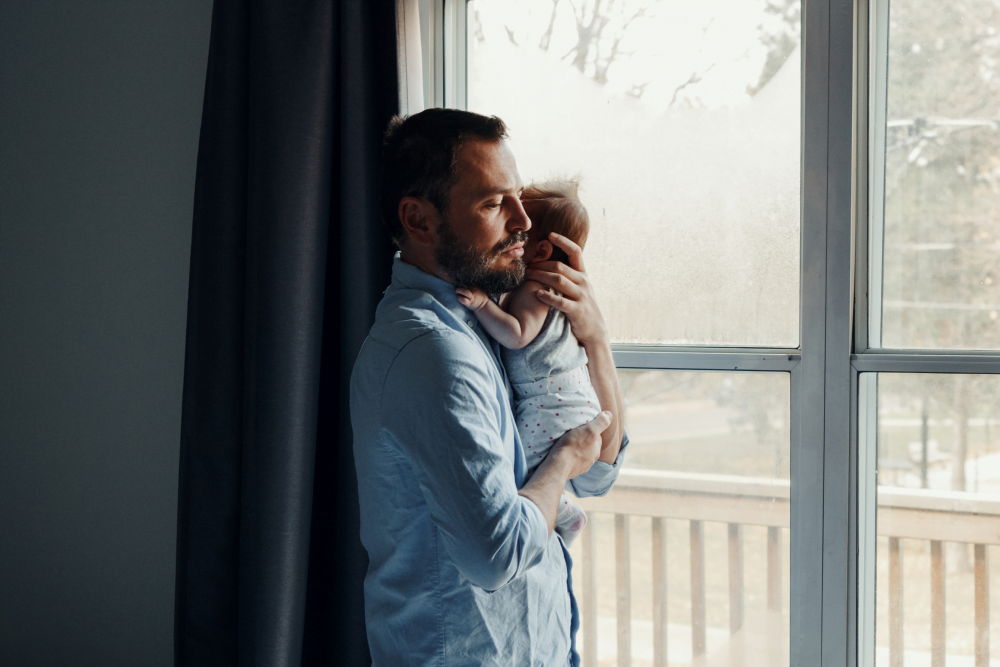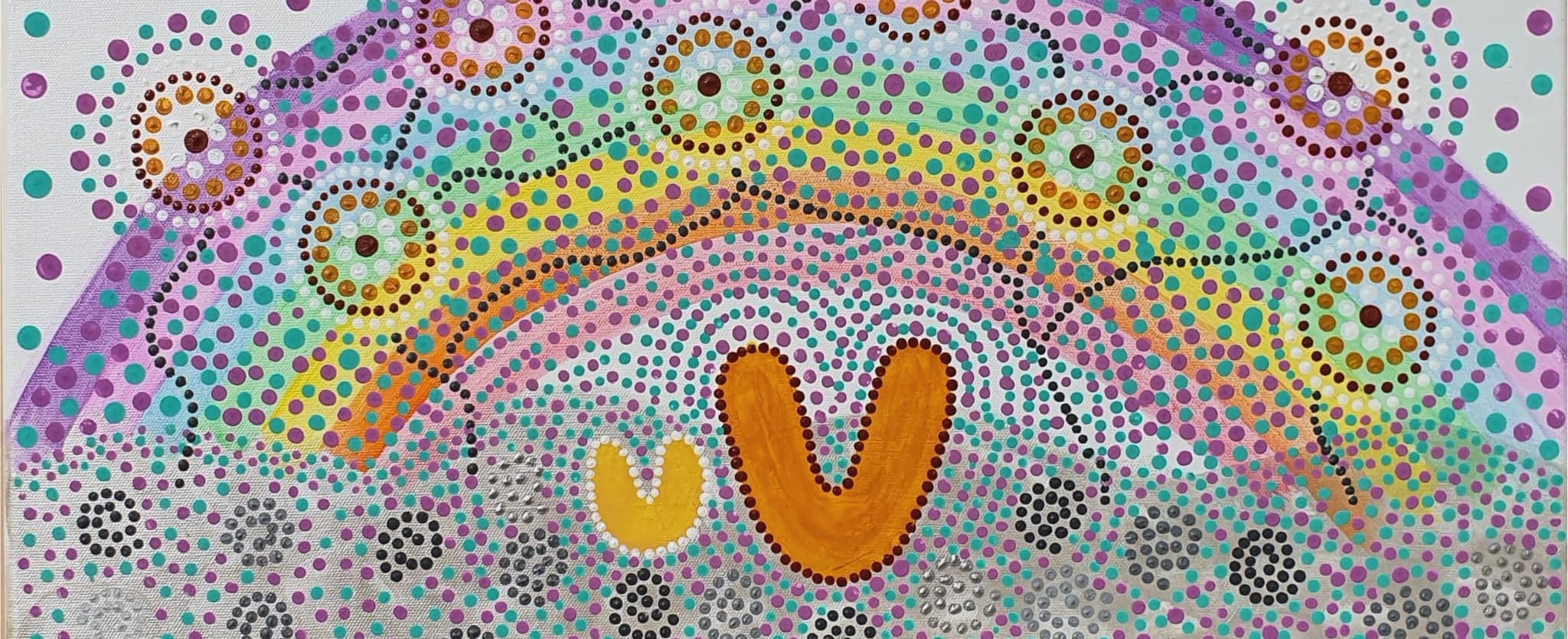Congratulations, you’re a new dad!
Everyone’s talking about the joys of fatherhood, but we know it’s not all plain sailing. You might be feeling a bit of everything right now, and that’s totally normal. But sometimes those feelings can be a sign of something more serious.
Let’s get into postpartum depression in men—yes, it’s a thing, and it’s more common than you think. Recognising postpartum depression symptoms in men is crucial, as they can often be overlooked
Hey dad! We need to talk about male postpartum depression.
In this blog we are using the terms postpartum and postnatal interchangeably, they refer to the twelve month period after the baby is born
While Australia has made great strides in recognising the mental health of pregnant and new mothers, we haven’t been doing so well in noticing and supporting new dads. According to Pregnancy and Baby, 1 in 10 new dads experience depression after the birth of their child. But many go undiagnosed and untreated.
Why is that? Well, for one thing, health services are set up to look after pregnant women and babies.
While dads are welcome to attend checkups, ultrasounds, and be at the birth, not many health professionals are asking dads how they’re really going, and that’s a problem. Prenatal and postnatal women are screened for depression, but not many are screening sad dads, and that needs to change.
Screening and treating prenatal and postpartum depression in fathers is key to their mental health and wellbeing. Addressing father’s mental health is crucial, as societal expectations often neglect the emotional struggles that new fathers face, leading to feelings of shame and isolation.
What is Paternal Postpartum Depression?
Before we get into the symptoms, let’s define what paternal postpartum depression really is. It’s a clinical depression that can affect fathers in the first year after their child’s birth.
It’s more than just the “baby blues”— it’s a serious mental health condition that can have long lasting effects if left untreated.
Paternal perinatal depression, which means includes depression during pregnancy and up to 12 months after the baby arrives the perinatal period, is often overlooked because of societal expectations that men shouldn’t express emotions and seek help. Recognising depression symptoms in new fathers is crucial for their well-being and the well-being of the family.
And while it might seem like things will get better when the baby is sleeping more, or your partner is less exhausted, or work lets up a bit, you might find that things get a lot worse. If your car started making noises and the engine overheating, you wouldn’t expect to solve that by driving it harder on rough roads. So don’t do that to yourself, either. Do some maintenance work on your mental health before you burn out your own engine.
Risk Factors for Postpartum Depression in Men
Several factors during the postnatal period can increase a new dad’s risk of postpartum depression:
Previous history of depression or mental illness: If you’ve struggled with depression or other mental health issues before, you’re more at risk.
Relationship stress: The transition to parenthood can strain even the strongest relationships.
Financial pressure: The added responsibility of a child can be overwhelming.
Lack of sleep: Sleep deprivation is a common trigger for mental health issues.
Hormonal changes: Yes, dads experience hormonal changes too! Studies have shown that men’s testosterone levels drop after the birth of their baby.
Feeling unprepared: If the pregnancy was unplanned or you feel unprepared for fatherhood, you may be more at risk.
Partner’s mental health: If your partner is experiencing postpartum depression, it can increase your own risk.
Physical symptoms of paternal postnatal depression
Postpartum depression or postnatal depression isn’t just in your head. Look out for these physical symptoms:
Unexplained aches and pains: Depression can cause physical discomfort that doesn’t seem to have a clear cause.
Changes in appetite: You might find yourself eating much more or much less than usual.
Digestive problems: constipation, diarrhoea, or stomach pain may be linked to depression.
Rapid weight gain or loss: Significant weight changes, especially if unintentional, can be a sign of depression.
Fatigue and low energy: Feeling tired even after rest is a common physical symptom.
Headaches or migraines: Frequent headaches can be a symptom of depression.
Changes in libido: A significant decrease in sex drive can be a symptom of depression.
Untreated paternal postpartum depression can also lead to emotional and behavioural problems in children, so early intervention before it affects those around you is key.

Emotional Signs of Daddy Baby Blues
As a new dad, you’ll feel a range of emotions, but ongoing negative feelings , anxiety and depression symptoms could be a sign of postpartum depression.
Feelings of worthlessness or inadequacy as a parent: Constantly doubting your ability as a father.
Persistent sadness or low mood: feeling down most of the day, nearly every day.
Excessive guilt or self-blame: Blaming yourself for things beyond your control.
Hopelessness: feeling like things will never get better.
Anxiety or panic attacks: feeling intense worry or sudden overwhelming fear.
Emotional numbness: feeling detached or unable to feel emotions.
Thoughts of self-harm or harming others: If you’re experiencing these, please seek help now.
Key Insight
Becoming a dad is an emotional rollercoaster, and it’s okay to admit you’re struggling. Don’t put off taking care of your mental health. Think of it like car maintenance; you need to take care of the engine (that’s you!) before it burns out.

When to Seek Help: Red Flags for New Dads
You need to know when your feelings have gone from normal adjustment to potential depression. Here are the red flags:
Symptoms persist for more than two weeks: It’s normal to have some bad days, but if you’re feeling down for more than two weeks, it’s time to get help.
Your feelings are impacting your ability to care for your baby or yourself: If you’re struggling to meet your own basic needs or your baby’s, you need to reach out.
You’re using alcohol or drugs to cope: If you’re using substances to get through the day, this is a big warning sign.
You’re having thoughts of self-harm or harming others: If you’re having thoughts of suicide or harming your baby, seek help now.
Your relationships are suffering: If you’re pushing away your partner, family, or friends consistently, you might need to talk to someone.
You can’t enjoy any part of being a dad: While it’s normal to feel overwhelmed at times, being unable to find any joy in your new role could be depression.
You’re having extreme mood swings: If your mood is shifting dramatically and frequently, this could be a mood disorder.
Screening tools like the Edinburgh Postnatal Depression Scale when administered by a health professional, can help you determine if you’re experiencing postpartum depression.
Remember, seeking help isn’t weakness; it’s strength and love for your family.
And while it might seem like things will get better when the baby sleeps more, or your partner is less tired, or work slows down a bit, you might find things get a lot worse.
If your car starts making noises and the engine overheats, you wouldn’t expect to fix that by driving it harder on rough roads. So don’t do that to yourself either.
Do some maintenance work on your mental health before you burn out your own engine.

Get Help: You’re Not Alone
If you’re noticing the behaviours or feelings mentioned above in yourself during your partner’s pregnancy or soon after having a child, yeah, you probably do need to talk to someone like your GP or ForWhen
We know that asking for help can be hard. There are a lot of expectations on men to be tough, independent, and able to provide for the family. But you can’t be a great dad if you’re struggling. Postnatal depression and anxiety in dads can affect the wellbeing of babies, kids, and partners. Plus, you need to do it for yourself to be your best self.
So how do I get help?
Jumping onto Google to look for support can be a like catching a flood in a bucket. It’s hard to know what is relevant and reliable, and costs aren’t always transparent. So call us @ForWhen on 1300 24 23 22. We take the time to hear what’s on your mind, assess how you’re going, and give you guidance and support in taking the next steps in caring for your mental health. We’ve done the hard yards in finding out what’s available, what’s good, and what it costs.
We listen to what dads need, and direct them to programs and services that focus on men’s experiences in mental health, and can connect you with other dads who can relate to what you’re going through.
If you’re a dad in Australia looking for mental health support, ForWhen is like having a savvy mate who can guide you to the right place, without any sketchy motives. This isn’t some fly-by-night operation. It’s backed by the Australian government and has Care Navigators in every state and territory.
When you call ForWhen, you’re going to be speaking with someone who knows mental health. The ForWhen team are all experienced clinicians who can listen to you and guide you to where to get the right help and treatment options for you. We don’t get kickbacks or financial incentives from any commercial interests. We’re here to get you connected with the right help within your budget.
ForWhen is a free Australian government backed team of Care Navigators in every state and territory, so we know the services in your region. And as part of a national team, we can get you in touch with telehealth help if there are limited options in your neck of the woods, or if you just prefer to do things online.
Do I have to go and see someone in person?
If you want to, sure. But if that feels like a bit much for you, then there are lots of other alternatives, like online counselling. Or by phone, if you don’t like the idea of videolink. And there are online self-help programs that can help you understand why you’re feeling the way you are, and positive steps you can take to make things better.
Like anything online, there are some great options that have strong research behind them, and a lot of others that are untested, unregulated, unreliable, and probably trying to sell you something. We can help you find services and programs that are a good fit for you, that come from reputable sources, backed with strong scientific evidence, and aren’t going to steal your data.
Are people going to try and put me on happy pills?
Not necessarily. In some situations, antidepressant medications can make a huge difference in recovering from postnatal depression and anxiety, but they are usually accompanied by counselling and therapy.
You might not need medication in treatment at all. Sometimes just talking to someone, either a professional or a peer support group with other dads who have been there, can make a world of difference.
Along with healthy eating, physical activity, and exploring ways to deal with painful feelings and history of depression, there are lots of ways to make things better. The main thing is not to go it alone, and get support from someone who won’t judge you.
Your GP is the first port of call for exploring whether you need medication, and if so, what sort and for how long. If you have worries about how medication might affect you, start with a conversation to address those concerns, and to look at all the options.
Prevention tips for dads
Rest when you can, and recognise that your partner is tired too. Don’t be tempted to compete with your partner about who is more tired. Remember you are a team. Support each other as much as you can.
Exercise regularly. This might look different from your usual routine, so be open to change. Taking the baby out for a walk is good for your health, is a great way to connect with bub, and gives your partner a break, too.
Support from friends and family. When people offer help, say yes. You’ll need it. And one day, it’ll be your turn to pay it forward.
Talk to someone about how you’re feeling. Your partner, your mates, your siblings, your parents. There is no shame in seeking professional support if you need it.
Learn coping strategies to prevent parental burnout and the importance of ‘me’ time, setting aside personal time to relax and rejuvenate, as these breaks can keep you fresh and energised for your family.

Getting prepared for fatherhood
Early parenthood is one of the biggest changes you’ll ever go through. Be ready to receive useful tips, and be prepared to politely ignore advice that doesn’t align with your attitudes and values. But remember that most people only want the best for you and your family.
New fathers’ groups and services are out there, and we can help you find them. Learning the nuts and bolts of caring for babies while maintaining your sanity can be gained from the wisdom of the group.
Invest in your relationships during the pregnancy and after bub is born. You’ll find a new appreciation for the great role models who were around when you were growing up. And if there were people who didn’t do the best by you as a kid now is a good time to work through that history with professional support, so you can learn and grow from those experiences.
Great dads need a great team
If you know a new dad, ask him how he is. Really ask him. And listen to the answer. If you’re worried about him, get him to call ForWhen to speak with one of our experienced Care Navigators.
No judgment, no issues, no cost. It might be the best gift he ever gets.
The ForWhen helpline is just a call away, ready to listen and connect you with the right local support that suits your needs. Call 1300 24 23 22 to get started.
Frequently Asked Questions
See our answers below to commonly asked questions we receive about postpartum depression in dads.
Yes, it is possible for men to experience postnatal depression. Studies estimate between 4 – 25% of men will experience depressive symptoms at some point during the first two months after their child’s birth.
For men, the most common symptoms of depression are disturbed sleep, irritability and changes in appetite. However, more severe symptoms can eventuate such as, changes in sexual drive, rage / aggression, substance abuse and relationship conflicts.
Distinguishing postpartum depression from regular stress or fatigue can be tricky, especially when new fatherhood naturally comes with its own set of pressures and sleepless nights. Look for persistent feelings of sadness, hopelessness, or a loss of interest in activities you once enjoyed; these might signal something more profound than just daily stress.
Regular fatigue might lift after a good night’s sleep or a short break, but postpartum depression lingers, often affecting your ability to function normally or enjoy fatherhood. If in doubt, consult a healthcare professional.
Work stress, financial stress, relationship problems, and parenting challenges can all lead to depression in fathers. Fathers who do not have a strong support system may be more likely to experience depression.
With your child, it might hinder the bonding process, making it harder to connect and engage, as depression often leads to withdrawal and disinterest in daily activities.
In your relationship with your partner, it may create tension or communication barriers, as the emotional strain and changes in behaviour associated with depression can be misunderstood or overlooked, leading to potential conflicts or disconnect.
Seek support from your local healthcare professional about how you are feeling, it can be helpful to bring your partner along so you can open up the conversation and get through it together. Dads can also join a fathers’ support group, which can be found through our .
Be there to listen without judgment and offer to help with daily responsibilities to alleviate some of the pressures they might be feeling. Connecting with healthcare professionals or support groups can also be a significant step and working together in a collaborative way can foster a supportive environment that allows for healing and recovery. If your partner is experiencing anxiety, see our helpful tips.

